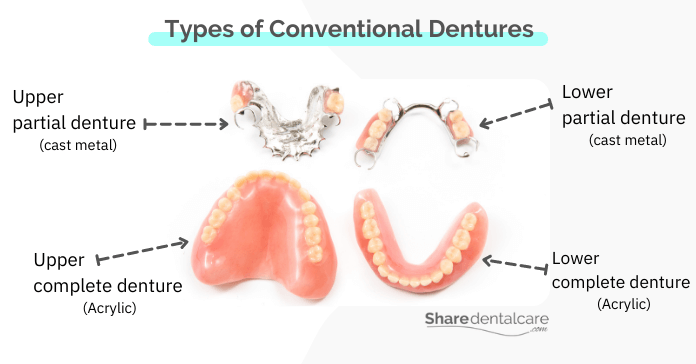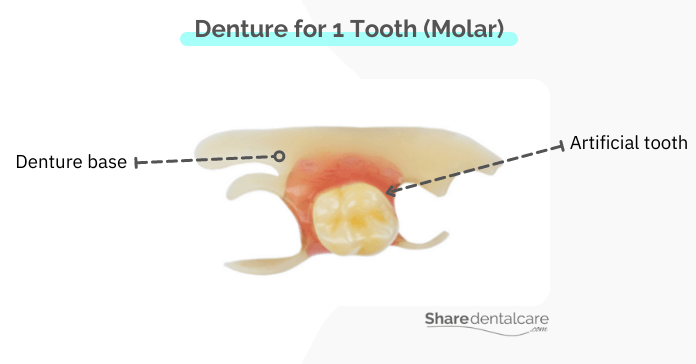Do you have only one missing tooth? You have several treatment options to replace a single missing tooth, for example, a dental bridge, implant, and partial denture for 1 tooth. There are many reasons why someone would need partial dentures. They’re affordable and easy to maintain. Also, partial dentures can restore your ability to speak or eat, so they can improve your quality of life.
Some dental professionals may recommend an implant because it is the most long-lasting option. However, partial dentures for a single tooth are a possibility for certain situations. In this article, we will discuss the pros and cons of a partial denture for 1 tooth and the alternatives.
What Are Dentures & Their Types?
Dentures are removable prostheses that replace missing teeth. They consist of an acrylic base with artificial teeth. Types of dentures include:
- Complete conventional dentures: they replace all of the missing teeth in your upper or lower edentulous jaw. Complete dentures are suitable for adult patients with no teeth.
- Partial conventional dentures: Dentures are designed to replace one or more of your teeth. They are not meant to replace all of your teeth. The rest of your natural teeth are kept. If you have 1 missing tooth, you can get a partial denture, for example, single molar partial denture.
- Implant-retained dentures: dentures that are retained by dental implants.

What is a Partial Denture for 1 Missing Tooth?
A partial denture for 1 tooth, also known as a dental flipper, is used by people who have only a single missing tooth. Partial dentures consist of a removable acrylic base with artificial teeth. They can fit over your natural gum tissue and attach to adjacent teeth with clasps.
Some dentists won’t recommend partial dentures for a single tooth as an option because they aren’t as stable or secure as other dental restorations, such as implants and bridges. However, partial dentures can be used to replace your single missing tooth if you’re willing to accept the drawbacks that come with this type of denture.

Pros of a Partial Denture for 1 Tooth
- Affordable alternative to dental implants or bridges.
- Doesn’t require any kind of surgery; you simply wear them over your gums.
- Improves your ability to speak and eat, which can improve your quality of life.
- Is easier to maintain than other types of dental restorations because they’re removable, which means you don’t need to worry about keeping them clean all the time.
- Partial dentures for a single tooth are a good way to replace a single missing tooth until you’re ready for more expensive options.
Cons of a Partial Denture for 1 Tooth
- It doesn’t offer stability as bridges or implants do.
- It doesn’t look as natural as dental bridges or implants.
- A Partial denture for 1 tooth looks more noticeable in your smile than traditional dentures, which may make you feel uncomfortable or embarrassed.
- Your gums could shrink around partial dentures over time, which can lead to poor fit and difficulty chewing.
- It can slip while you’re eating or speaking.
- Unlike bridges and dental implants, partial dentures for a single tooth aren’t permanent or long-lasting.
What are the Alternatives to Partial Dentures for Missing Single Tooth?
If you don’t want to wear dentures, there are other alternatives available to replace a single tooth. For example, implants and bridges both offer long-term restorations that are more stable than partial dentures and will provide you with a better quality of life. However, both options may be more expensive than partial dentures for 1 tooth. Read more about a removable denture or fixed bridge for one missing tooth.
A Partial Denture for 1 Tooth – Conclusion
Partial dentures for 1 tooth are a good option if you have just one missing tooth and don’t want to spend the money on implants or bridges. It is important that you’re aware of the drawbacks, such as lack of stability and difficulty chewing certain foods. If these cons sound like they may be too much for you to handle, we recommend denture alternatives: dental implants or bridges.